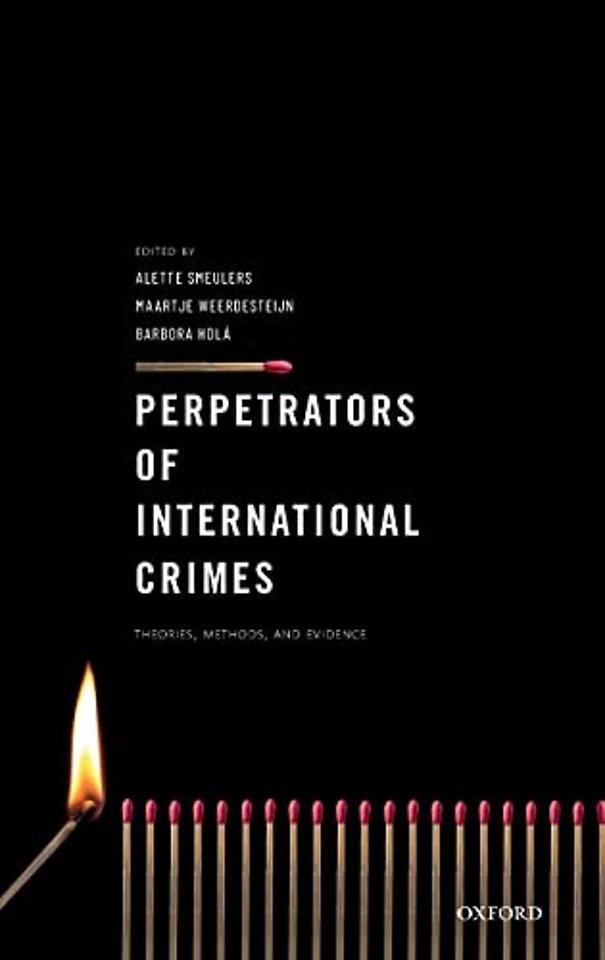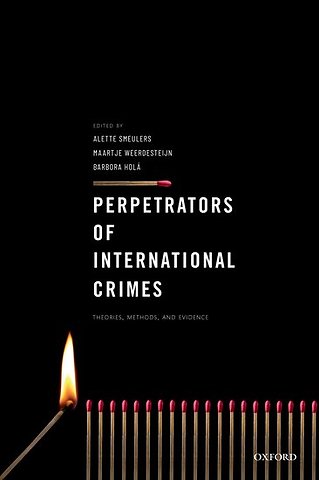Perpetrators of International Crimes
Theories, Methods, and Evidence
Samenvatting
Why would anyone commit a mass atrocity such as genocide, crimes against humanity, war crimes, or terrorism? This question is at the core of the multi- and interdisciplinary field of perpetrator studies, a developing field which this book assesses in its full breadth for the first time.
Perpetrators of International Crimes analyses the most prominent theories, methods, and evidence to determine what we know, what we think we know, as well as the ethical implications of gathering this knowledge. It traces the development of perpetrator studies whilst pushing the boundaries of this emerging field. The book includes contributions from experts from a wide array of disciplines, including criminology, history, law, sociology, psychology, political science, religious studies, and anthropology. They cover numerous case studies, including prominent ones such as Nazi Germany, Rwanda, and the former Yugoslavia, but also those that are relatively under researched and more recent, such as Sri Lanka and the Islamic State. These have been investigated through various research methods, including but not limited to, trial observations and interviews.
Specificaties
Inhoudsopgave
Introduction, Alette Smeulers, Barbora Holá, and Maartje Weerdesteijn
PART I: PERPETRATOR STUDIES
1: Historical Overview of Perpetrator Studies, Alette Smeulers
2: Theories, Methods, and Evidence, Alette Smeulers, Barbora Holá and Maartje Weerdesteijn
PART II: REFLECTING ON METHODS AND SOURCES
3: Perpetrators, Fieldwork, and Ethical Concerns, Chandra Lekha Sriram
4: Interviewing Perpetrators against the Backdrop of Ethical Concerns and Reflexivity, Mina Rauschenbach
5: Studying 'Perpetrators' through the Lens of the Criminal Trial, Thijs Bouwknegt and Adina-Loredana Nistor
PART III: STUDYING PERPETRATION
6: Perpetration as a Process: A Historical-Sociological Model, Ugur Ümit Üngö
7: The Margins of Perpetration: Role-Shifting in Genocide, Kjell Anderson
8: Beyond Perpetrators: Complex Political Actors surrounding the 1994 Genocide in Rwanda, Erin Jessee
PART IV: STUDYING PERPETRATORS: CASE STUDIES
9: Studying Perpetrator Ideologies in Atrocity Crimes, Jonathan Leader Maynard
10: Religion and International Crimes: the Case of the Islamic State, Pieter Nanninga
11: The Female Tigers of Sri Lanka: The Legitimation of Recruitment and Fight, Georg Frerks
12: The Rationality and Reign of Paul Kagame, Maartje Weerdesteijn
PART V: STUDYING PERPETRATORS ON TRIAL: CASE STUDIES
13: Nothing Must Remain: The (In)visibility of Atrocity Crimes and the Perpetrators' Strategies using the Corpses of their Victims, Caroline Fournet
14: Plausible Deniability: The Challenges in Prosecuting Paramilitary Violence in the former Yugoslavia, Iva Vukusic
15: Perpetrators on Trial: Characteristics of War Crime Perpetrators Tried by Courts in Bosnia and Herzegovina & ICTY, Mirza Buljubasic and Barbora Holá
16: 'Like Mirrors of Morality': Social Support for Nazi War Criminals in Post-War Germany, Susanne Karstedt
Concluding Thoughts, Alette Smeulers
Anderen die dit boek kochten, kochten ook
Net verschenen
Rubrieken
- aanbestedingsrecht
- aansprakelijkheids- en verzekeringsrecht
- accountancy
- algemeen juridisch
- arbeidsrecht
- bank- en effectenrecht
- bestuursrecht
- bouwrecht
- burgerlijk recht en procesrecht
- europees-internationaal recht
- fiscaal recht
- gezondheidsrecht
- insolventierecht
- intellectuele eigendom en ict-recht
- management
- mens en maatschappij
- milieu- en omgevingsrecht
- notarieel recht
- ondernemingsrecht
- pensioenrecht
- personen- en familierecht
- sociale zekerheidsrecht
- staatsrecht
- strafrecht en criminologie
- vastgoed- en huurrecht
- vreemdelingenrecht







